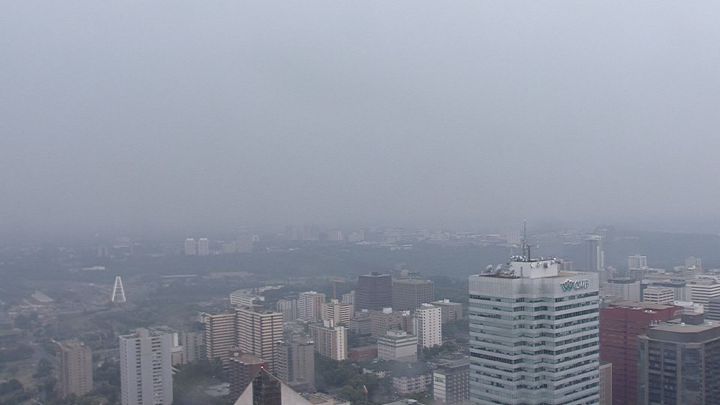More smoke from the B.C. wildfires is expected to drift over into central Alberta, prompting Environment Canada to issue a special air quality statement Tuesday for parts of western and central Alberta, including the Edmonton region.

The weather agency said a cold front has flushed a lot of the smoke out of the province, but the smoke will once again cross the Rockies Tuesday evening and into Wednesday.
According to the Alberta Environment website, Edmonton’s air quality health index could reach a Level 5 on Wednesday.
“We may experience periods where there’s increased haze in the air. You may actually be able to smell or taste the wildfire smoke itself and that’s a lot of the particulate matter, the very fine particles that are blowing as a result of the combustion of the fires burning in British Columbia,” said Dr. Chris Sikora with Alberta Health Services.
READ MORE: Fire ban, closures in place in Banff, Kootenay national parks as wildfire burns
As of early Tuesday morning Environment Canada was uncertain of where the smoke will set up, but said current indications are that the corridor of thickest smoke and poorest air quality will be between Hinton, Red Deer and Edmonton.
While the province forecast Wednesday’s air quality at Level 5, Environment Canada said, “due to the smoke, the Air Quality Health Index (AQHI) will likely reach 10 in parts of central Alberta on Wednesday.”
Watch below: Edmonton’s long-term weather forecast for July 18

Alberta Health measures the AQHI on a scale of 1 to 10. The higher the number, the greater the health risk.
“When the AQHI trips over into that seven or higher, the high-risk environment, we do recommend people in that high-risk category actually reduce their strenuous activity, stay indoors, reduce the strain on the heart and lungs,” Sikora said.
“Those especially sensitive can be those at the extremes of age — the very young and the very old — or people who have underlying heart or lung conditions.”
READ MORE: B.C. wildfires map 2017: Current location of wildfires around the province
Individuals may experience symptoms such as increased coughing, throat irritation, headaches or shortness of breath. Children, seniors, and those with cardiovascular or lung disease, such as asthma, are especially at risk.
Environment Canada said generally, wearing a mask is not the best way to protect your health during a smoke event and may lead to a false sense of security.
The statement suggested those with breathing difficulties should find an indoor place that is cool and ventilated. “Using an air conditioner that cools and filters air may help. If you open the windows you may let in more polluted air. If your home isn’t air-conditioned, consider going to a public place (library, shopping mall, recreation centre) that is air conditioned.”
Tuesday’s alert comes two days after Environment Canada issued a previous special air quality statement. Wildfire smoke in the Edmonton region pushed the AQHI to 7 on Sunday afternoon.
A strong smoky odour could be detected in the air and a haze seen across the city.
Close to 40,000 people have been evacuated from the southern and central B.C. interior because of the fires and another 17,000 remain on evacuation alert.
READ MORE: South Okanagan prepares for influx of wildfire evacuees
For up-to-date information on the air quality across the province, visit Alberta Health’s website.
To see a radar map of the smoke forecast, visit Alberta Wildfire’s website.
Want your weather on the go? Download the Global News Skytracker weather appfor IOS and Android.
— With files from Caley Ramsay and Emily Mertz
- Buzz kill? Gen Z less interested in coffee than older Canadians, survey shows
- ‘She gets to be 10’: Ontario child’s heart donated to girl the same age
- Bird flu risk to humans an ‘enormous concern,’ WHO says. Here’s what to know
- Naloxone-resistant street drug linked to 9 deaths in Eastern Canada seized in Alberta





Comments